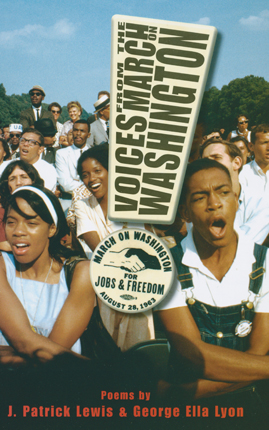| Voices from the March on Washington Author: Lewis, J. Patrick | ||
| Price: $21.66 | ||
Summary:
Powerful poems weave together multiple voices to tell the story of the March on Washington, DC, in 1963.
| Added Entry - Personal Name: | Lyon, George Ella |
| Accelerated Reader Information: Interest Level: MG Reading Level: 6.00 Points: 2.0 Quiz: 169540 | Reading Counts Information: Interest Level: 6-8 Reading Level: 7.10 Points: 5.0 Quiz: 64983 | |
Reviews:
Kirkus Reviews (+) (05/15/14)
School Library Journal (08/01/14)
Booklist (+) (09/01/14)
The Hornbook (00/11/14)
Full Text Reviews:
School Library Journal - 08/01/2014 Gr 5 Up—In this collection of 70 short poems, Lewis and Lyon introduce the 1963 March on Washington through the perspectives of those who took part. The participants, young and old, come from all over (a group of students from Spelman College, an Iowan farm girl, an unemployed college graduate, and a six-year-old riding atop her father's shoulders), and they express a variety of feelings: wide-eyed optimism, frustration, cynicism, and apprehension. The first poem, "Reflection," a concrete poem in the shape of the National Mall's reflecting pool, sets the stage by noting that many of the 250,000 marchers are drawn by "unfulfilled promises," while in "Crossing the Potomac," a marcher affirms, "We'll turn the other cheek/like the Good Lord said, but we have come/for our rights and we won't turn back." The book contains plenty of detail and references to actual people, including the organizers (A. Philip Randolph and Bayard Rustin), the speakers, and singers Marian Anderson, Mahalia Jackson, and Joan Baez. Many Southern marchers, accustomed to Jim Crow laws, drink alongside whites at public water fountains for the first time. The poems keep the action moving forward, as the marchers arrive, assemble, and are inspired by the significance of the peaceful demonstration. Supplemental matter helps track fictional voices and real individuals. This well-crafted introduction to the Civil Rights era deserves a wide audience, as these poems, with their plain-spoken, honest emotions, offer insight into the past, and inspiration to continue the struggle.—Marilyn Taniguchi, Beverly Hills Public Library, CA - Copyright 2014 Publishers Weekly, Library Journal and/or School Library Journal used with permission.
Booklist - 09/01/2014 *Starred Review* Dr. Martin Luther King Jr. called it “the greatest demonstration for freedom in the history of our nation.” The historic August 28, 1963, march on Washington drew 250,000 people to the nation’s capital and wrote a new chapter in the history of the civil rights movement. Now poets Lewis and Lyon have written their own chapter in this collection of original poems that examine and celebrate the occasion and its aftermath in a variety of voices, both real and imagined. The coauthors pose three questions—Who were the marchers? Why did they risk their lives to be there? How were they changed by that day?—and answer them in eloquent verse, both free and rhymed. The imagined voices memorialize the splendid variety of the people who marched, among them Ruby May Hollingsworth, 6, a first-grader from Mountain Home, Arkansas; Emma Wallace, 23, a farmhand from Seymour, Iowa; and, from Amarillo, Texas, Raymond Jarvis, 25, an out-of-work store clerk with a BA degree in business administration. From any perspective, however, the march was history in the making, and this collection is a fitting memorial to it. - Copyright 2014 Booklist.



